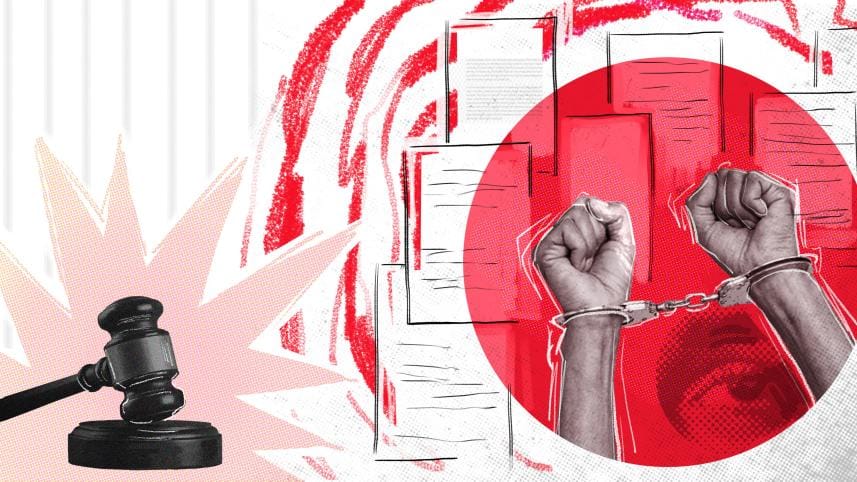The snowball effect of academic crimes

I am trying to decode the symbolism of a murder that occurred 17 years ago. In February 2006, a professor of Rajshahi University was killed after he detected plagiarism and piracy in 10 of the 11 research papers submitted by his junior colleague as part of his promotion application. Prof Syed Taher Ahmed would have "turned-him-in." The applicant realised that his career would end if he allowed his senior colleague to reveal the academic forgery. Mia Muhammad Mohiuddin, an associate professor in Taher's department, reacted the only way he could – resorting to violence. Emboldened by his political connections, thanks to his minister brother-in-law, he hired men to end Taher's life. The body was dumped into the septic tank in the victim's house. Two days later, the putrid smell of the missing professor's decaying body filled the air and brought the crime to the public's attention.
In a rare show of dexterity and courage, in less than two months, police charged six people, including Mohiuddin, his brother, the Rajshahi University unit president of Islami Chhatra Shibir at the time, and a university staff member. A judgment announced on May 22, 2008 acquitted two charge-sheeted accused. But the trial dragged on, and bail was given to one main accused. Prof Ahmed's daughter, Shegufta Tabassum Ahmed, who had just started studying law as an undergraduate student when her father was murdered, resolved to seek justice. Ironically, it was her father who had convinced her to become a lawyer. He assured her that she wouldn't need to practise law in a courtroom. She could use her expertise in teaching or consulting. But as fate would have it, this young lawyer would have to move mountains to guarantee justice for her wronged father. The powerful lobby behind the murderers kept delaying the trial process to deny justice for Shegufta's family.
But Shegufta's persistence paid off. A six-member bench of the Appellate Division, headed by Chief Justice Hasan Foez Siddique, delivered the last verdict in the case on September 15 last year. The death sentences against two convicts were upheld, while the other two received life sentences. Two prisoners on death row were hanged on Thursday, 17 years after the murder. The soul of a dead father can now rest in peace. Rajshahi University can feel slightly relieved at the execution of the perpetrators of a heinous crime.
As an academic, what worries me is the exponential unfolding of a simple instance of academic dishonesty. The seed of violence was hiding the kernel of a criminal mind that felt it was his right to pursue wrong. The murder took place before this hullabaloo that we have over artificial intelligence acting as both perpetrator and police of a crime.
The saga, if I may use the genre to describe the event, has many layers. At a family level, a daughter rose to the occasion to pursue justice. A dead father, quite ominously, initiated her in an academic discipline that would secure justice for him in this earthly world. At an academic level, it goes on to show how an act of academic dishonesty keeps on snowballing. They say that lies breed lies. Here, crimes breed crimes.
A university teacher used pirated and plagiarised materials to claim authorship and climb up to the level of an associate professor. For the last rung of his academic ladder, he had to face Prof Taher Ahmed. In a Ludo game, Taher would have appeared like the big snake before you reached your goal. Mohiuddin's animal instinct came out. In the words of the judge who wrote the verdict, he "annihilated Dr Taher from this world presuming that if Professor Taher lived, the chance of his getting promotion would be zero." At a political level, the case showed much muscle-flexing as it both charged and acquitted a high-profile student leader. For justice to be delivered, the powerful bodies needed to be in cosmic alignment. Even the convicts knew that. According to jail witnesses, the prisoners on death row asked to say their prayers one last time after solace was offered to them by an Imam.
As an academic, what worries me is the exponential unfolding of a simple instance of academic dishonesty. The seed of violence was hiding the kernel of a criminal mind that felt it was his right to pursue wrong. The murder took place before this hullabaloo that we have over artificial intelligence acting as both perpetrator and police of a crime. The open-access ChatGPT is the e-genie that can write stuff for you at your command. Then again, there are other e-genies that can catch the theft. Whether we like it or not, machines will make our lives easier. And civilisation will always be comforted by the ease offered by technology. Nobody remembers number tables anymore, because our phones have an in-built calculator. You don't need to memorise your mother's phone number, because you can always speed-dial or give a voice command. How will this overreliance on someone else's efforts or memory affect us? The lure of presenting someone else's work as your own is as strong as ever. We are all being sucked into a logic of ease. They will soon dump anyone who gets in their way into the hole that man has dug.
The challenge is how to use this forgery in an ethical manner. Yes, you heard it right: how do you become creative in hiding the traces of your stealing and validate AI-driven research as your own? That is where the new focus of pedagogy is being shifted. Earlier this month, the University of Kentucky formed a new committee to look at the impact of artificial intelligence and tools like ChatGPT on higher education and to recommend effective uses of AI.
Perhaps, both Taher and Mohiuddin would have been alive if technology had been there to protect them from academic sacrilege. Seriously, though, we can blame the machine as much as we like, but it has become an integral part of our existence. Surely, without technology, the crime would not have been unearthed with such speed. It was humans who committed the crime. It was humans who felt wronged that a promotion would not happen because of a man, and therefore he deserved to die. His life was wasted and disposed of like filth. But from the dirty filth, the truth appeared. The victim's flesh and blood appeared in court and demanded justice in the name of the law. The convicts, convinced of their cold calculation, cold-bloodedly killed a man who would not deviate from telling the truth. The murder case of Prof Taher Ahmed reminds us of the human conundrum that often loses its way in the name of truth and falsehood. Technology is just a conduit through which this truth and falsity must pass!
Dr Shamsad Mortuza is a professor of English at Dhaka University.




 For all latest news, follow The Daily Star's Google News channel.
For all latest news, follow The Daily Star's Google News channel. 


Comments